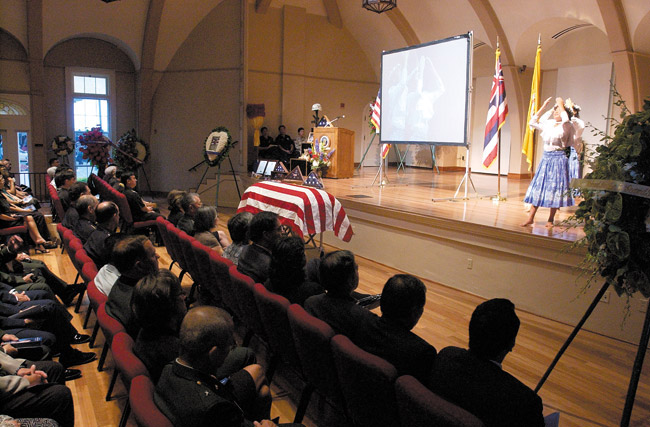Bury Or Burn? Matter Of Faith

Army Staff Sgt. Henry Garcia carries the urn with the ashes of Tsuyoshi ‘Nick’ Nishimoto, a Korean War veteran and prisoner of war, between members of the Korean War Veterans Association, for a memorial and inurnment burial at National Memorial Cemetery of the Pacific at Punchbowl in March. Army Pfc. Allan Sweis carries an American flag at right, while Sgt. Shannon Williams and Pfc. Isabel Ortega follow with a second American flag. Army personnel were part of the funeral honor guard from the 45th Sustainment Brigade, 25th Infantry Division at Schofield Barracks | Bruce Asato/Star-Advertiser photo
Here in Hawaii, there are primarily two religious customs for dealing with the deceased: burn or bury. These options usually are tied to whether a religion teaches reincarnation or resurrection. In general, religious traditions that have notions of reincarnation cremate the dead and observe a series of memorial rites to facilitate the transformative process that moves the spirit of a loved one to the next stage of spiritual existence. (More on this in a subsequent column.) But religions that believe in resurrection — Judaism, Christianity and Islam — bury the dead.
There are two main reasons why Jews, Christians and Muslims bury their dead.
One, they believe in a bodily resurrection, and cremation apparently renders this more difficult. Perhaps the clearest example of bodily resurrection comes from the Christian tradition, where the resurrected Christ appeared in a bodily form that could be seen and touched by his disciples. Because, in part, of this shared belief in bodily resurrection, enemies of Jews, Christians and Muslims historically have burned the bodies of the faithful to deny them the hoped-for afterlife. Cremation thus became a rejected practice in the three religious traditions, and even now some of the more conservative religious groups will deny a proper funeral for those choosing cremation or refuse to inter cremated remains in their cemeteries. It should be noted, however, that not all Jews, Christians and Muslims in contemporary society view the issue of cremation in this way.
A second reason why burial is commonly practiced in Judaism, Christianity and Islam is because followers of all three religions worship the same god and believe in similar stories.

Funeral service in 2005 for Sgt. Deyson Cariaga, a Hawaii National Guardsman killed in Iraq, in Mission Memorial Auditorium. Dancers from New Hope Christian Fellowship did a hula performance. FL Morris/Star-Advertiser photo
As if that weren’t enough, God added that as painful as childbirth would be, she would still desire it. There are sadomasochistic tones here, but this etiological story accounts for the fine line between pain and pleasure during childbirth. Though the serpent’s punishment was harsh, and the woman’s punishment cruel, the man’s was worst of all: God punishes him because he listened to his wife (there’s a not-so-subtle message in here for husbands) and ate the fruit. As punishment, Adam was sentenced to do yard work. This may seem benign, but the punishment is profound. The Hebrew word for ground is “adamah.” Thus from “adamah” God created Adam. The English equivalent would be, from earth God fashioned earthling. The punishment, in other words, separates Adam from the source of his identity. The ground would no longer recognize Adam and produce for him. A part of him would be lost. Though he ate from the tree of knowledge, he will not know who he is, know where he came from or know where he is headed. The story concludes with the man and woman cast out of the garden, and God arming angelic beings with flaming swords to guard its entrance and prevent humankind from turning back and eating from the tree of eternal life. God denies eternal life to Adam and Eve.
What happened to Adam and Eve? Adam and Eve traveled east of Eden where, according to Islam, the couple prayed to God for forgiveness and were forgiven. The couple’s fate is not so clear in Judaism and Christianity. What is clear is the separation and alienation Adam and Eve experienced that would shape their fate. Herein lies the power of religion. The word “religion” literally means to “reconnect.” When the body of the dead is buried then, the body is returned to the ground, identity is restored and one is made whole again.
In short, burying the body gives the dead life.
misfitspirit808@gmail.com



